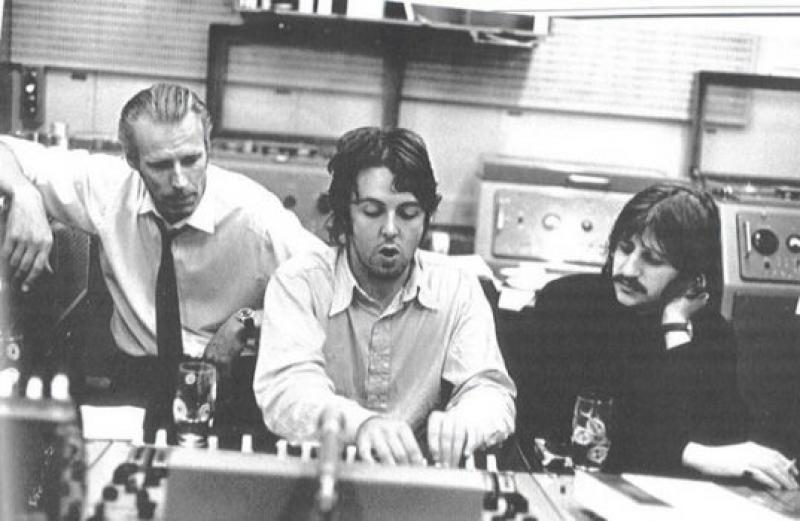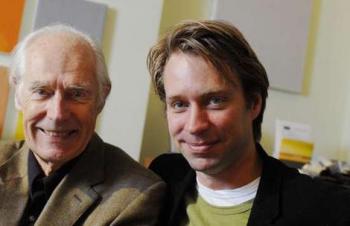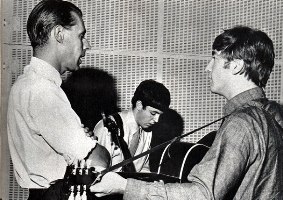George Martin (1926-2016), record producer and 'fifth Beatle' | reviews, news & interviews
George Martin (1926-2016), record producer and 'fifth Beatle'
George Martin (1926-2016), record producer and 'fifth Beatle'
Arena profile recalls the monumental legacy of the world's greatest record producer

For many pop-pickers, the presiding image of the Queen’s Golden Jubilee will be Brian May (he – yes, of course – of Queen) grinding out the national anthem on the roof of Buckingham Palace. For me, there was a much more meaningful moment later the same evening when Paul McCartney, Her Majesty and a tall grey-haired man gathered on the party stage, rubbing shoulders and so magically recreating a little trope of our recent cultural history.
The 2002 trio signified a peculiarly British mix of ancient dynasty and pop genius: something of that order had of course also happened 37 years earlier, when the four went to the Palace to pick up their MBEs. Then, Her Maj wouldn’t have had the faintest idea who George Martin was (she knighted him in 1996). Francis Hanly’s Easter Monday Arena portrait brings him into crisp but gentle focus, conveying his courtliness and generosity, with the biggest surprise that, despite his richly posh accent, he was born into the working class (in 1926) – remembering at one point that his mother didn’t have even tuppence to buy him an ice cream.
 Obviously gifted musically, he seems to have been lucky in his schooling in London up to and through the war. At 16, ambitious to be the next Rachmaninov, he knew he had to upgrade his vowels. “I consciously tried to speak like the BBC people did,” he tells his music-producer son Giles (pictured above, Martin and son), who chats with his dad on a sofa at various points in the programme.
Obviously gifted musically, he seems to have been lucky in his schooling in London up to and through the war. At 16, ambitious to be the next Rachmaninov, he knew he had to upgrade his vowels. “I consciously tried to speak like the BBC people did,” he tells his music-producer son Giles (pictured above, Martin and son), who chats with his dad on a sofa at various points in the programme.
Hanly exposes Martin’s joyous catholicity of taste: classical music, film music, silly songs (he produced “Nelly the Elephant”: the octogenarian lolls in an armchair and conducts Mandy Miller singing the horrible thing in 1956), and then even sillier ones. For Parlophone, which Martin ran for 10 years from 1955, the Goons recorded some of their daftest stuff; and it will have surprised some, who, when they think Martin just think Fab Four, to find Rolf Harris and Bernard Cribbins making quite substantial contributions here.
Michael Palin also cheerily interviews him about his penchant for comedy, which he’d clearly finessed by his mid-thirties – but this belongs to what even Martin calls “such a different time”. He’s right. That’s the first half-hour done. We want, please, The Beatles.
 It’s a familiar story: Martin telling Brian Epstein in 1962 that his multiply turned-down Liverpool combo weren’t up to snuff but allowing him anyway to book them in for an hour’s studio time; insisting that pro drummer Andy White replace Ringo on the about-to-be-released version of “Love Me Do”; pepping up “Please Please Me”, which, released in 1963, kicked off the single most creative seven-year stretch in British musical history. George Martin was at its nerve centre (pictured above: very early days with Paul and John), writing scores for The Beatles, encouraging and refining their variable technique, playing on many tracks, allowing them to go way off piste in the studio for Sgt Pepper, gloriously uniting them – but knowing it was over – for Abbey Road.
It’s a familiar story: Martin telling Brian Epstein in 1962 that his multiply turned-down Liverpool combo weren’t up to snuff but allowing him anyway to book them in for an hour’s studio time; insisting that pro drummer Andy White replace Ringo on the about-to-be-released version of “Love Me Do”; pepping up “Please Please Me”, which, released in 1963, kicked off the single most creative seven-year stretch in British musical history. George Martin was at its nerve centre (pictured above: very early days with Paul and John), writing scores for The Beatles, encouraging and refining their variable technique, playing on many tracks, allowing them to go way off piste in the studio for Sgt Pepper, gloriously uniting them – but knowing it was over – for Abbey Road.
A sleek-looking Ringo talks fascinatingly with the old man about his drumming as they listen to "Drive My Car" - except Martin isn't really "old" at all and is clearly still riveted by how the song works. Paul, chirpy as ever but now also rather jowly, identifies Martin’s time as an observer in the Fleet Air Arm as the model for his success as a producer. With John and George gone, it’s reassuring to have three-fifths of The Beatles at least recall for us exactly how things at Abbey Road unfolded. Is there a downside to the Martin story? His compositions for Yellow Submarine were dreary (not alluded to in the programme). A studio he built on Montserrat was destroyed in a 1989 hurricane. Deafness now prevents him from enjoying music.
But the salient feeling emerging from this Arena is of an unusually serene, comfortably countrified grandpa, happily married for 45 years, an astute, polite Englishman who entered history without knowing it, is reluctant to acknowledge that he did but who knows more about the revolution he helped foment than all the world’s Beatles watchers put together. Cilla, Jeff Beck, America (each puts in a brief appearance here): sure, good acts but, by comparison, footnotes. Without forcing it down our throats, these 90 minutes leave us in no doubt as to what Martin’s real, monumental legacy is.
The future of Arts Journalism
You can stop theartsdesk.com closing!
We urgently need financing to survive. Our fundraising drive has thus far raised £33,000 but we need to reach £100,000 or we will be forced to close. Please contribute here: https://gofund.me/c3f6033d
And if you can forward this information to anyone who might assist, we’d be grateful.

Subscribe to theartsdesk.com
Thank you for continuing to read our work on theartsdesk.com. For unlimited access to every article in its entirety, including our archive of more than 15,000 pieces, we're asking for £5 per month or £40 per year. We feel it's a very good deal, and hope you do too.
To take a subscription now simply click here.
And if you're looking for that extra gift for a friend or family member, why not treat them to a theartsdesk.com gift subscription?

Add comment